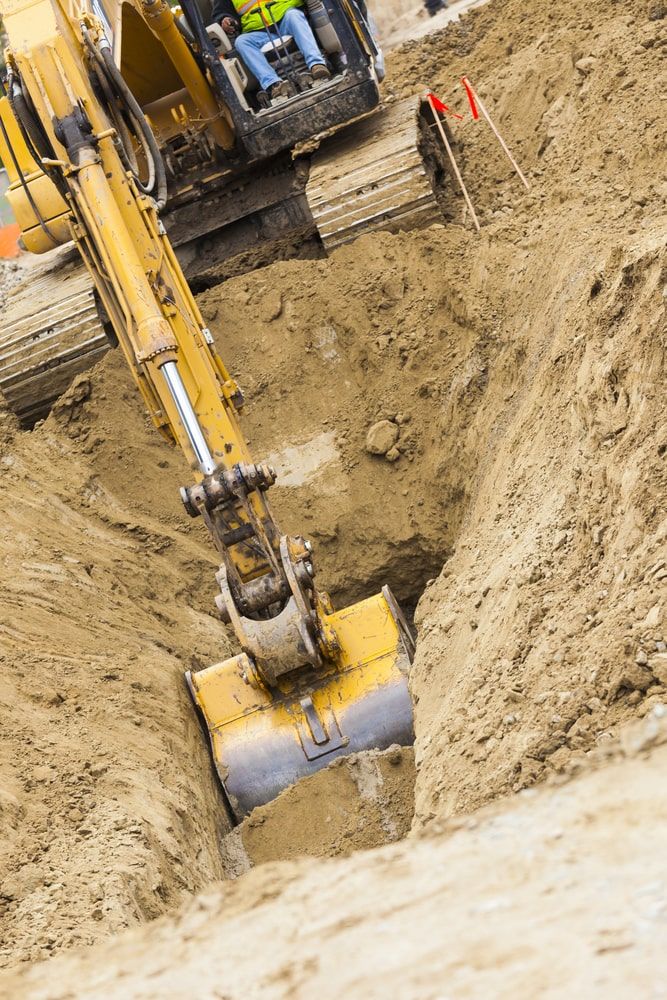Finest Dump Truck Companies in Ohio - Top-Rated Dump Truck Providers
Wiki Article
Comprehensive Excavation Approaches: Understanding the Principles for Success
In the realm of building and civil design, the importance of effective excavation methods can not be overstated. The cautious preparation, specific implementation, and precise interest to information called for in excavation tasks require a comprehensive technique that includes numerous fundamental aspects. From first dirt evaluation to the implementation of safety procedures and normal progression surveillance, grasping these core components is vital for accomplishing success in any kind of excavation endeavor. Nonetheless, truth proficiency lies not merely in recognizing these fundamentals however in perfectly integrating them to browse the complexities of excavation jobs with skill.Comprehending Excavation Job Planning

The initial stage of any type of excavation project is the planning phase, where important choices are made that can considerably impact the end result of the project. Comprehending the job range, timeline, and spending plan restrictions is vital for creating an extensive excavation plan that guarantees the project's success.
One secret aspect of excavation job planning is the development of a detailed timeline that outlines the series of activities, turning points, and target dates. This timeline offers as a roadmap for the project team, permitting them to track development and make required adjustments to guarantee the task remains on schedule. In addition, a distinct spending plan that accounts for all expenses, including devices rental, labor expenses, and materials, is vital for avoiding cost overruns and hold-ups. By meticulously considering all these factors throughout the drawing board, excavation projects can be performed successfully and efficiently, causing successful end results.
Soil Evaluation and Site Assessment
Performing thorough dirt analysis and site evaluation is a vital action in the prep work phase of any excavation project. Soil analysis includes identifying the composition, structure, and homes of the dirt at the excavation website. This details is crucial for comprehending the soil's bearing capacity, wetness material, and potential for disintegration, which are crucial consider figuring out the excavation methods and devices required for the project.Site assessment exceeds dirt analysis and includes a more comprehensive evaluation of the general website conditions. This assessment includes determining any potential dangers, such as below ground utilities, environmental issues, or unsteady terrain, that can impact the excavation process. By thoroughly evaluating the site, task managers can develop reliable excavation strategies that prioritize safety and security, performance, and environmental management.
Utilizing innovative innovations like ground-penetrating radar, dirt tasting, and drone studies can enhance the precision and efficiency of dirt evaluation and site assessment. Spending time and resources in these initial steps can inevitably conserve time and protect against expensive delays or problems throughout the excavation process.
Devices Selection and Use
Effective excavation jobs rely heavily on calculated equipment selection and utilization to guarantee optimal efficiency and productivity. Picking the appropriate equipment for the job is critical in making the most of effectiveness and reducing downtime. Variables such as the type of dirt, depth of excavation, and task scope play a substantial function in determining the most suitable equipment for the job handy.
Along with selecting the proper tools, appropriate use is essential to task success. Operators should be educated to deal with the devices securely and effectively - excavating ohio. Routine maintenance checks and timely repairs aid stop breakdowns and make sure consistent performance throughout the task
Safety And Security Procedures and Rules Conformity
In the world of excavation jobs, prioritizing safety and security actions and conformity with laws is extremely important to ensuring a protected and legally sound functional setting. Precaution incorporate a variety of techniques, consisting of performing detailed website analyses, executing correct signs and barriers, and providing adequate safety and security training for all personnel entailed in the excavation procedure. Adherence to guidelines, such as OSHA demands in the USA, makes sure that the excavation task fulfills the required criteria to protect workers, bystanders, and the surrounding atmosphere.
Monitoring Development and Adjusting Methods
How can project managers properly track the improvement of excavation projects and adapt their techniques accordingly to optimize outcomes? Tracking progression is important for making sure that excavation projects stay on track and meet deadlines. Task managers can make use of various devices and methods to track development, such as daily development records, routine website evaluations, and advanced surveillance innovations like drones and general practitioners tracking systems. By constantly checking the project's improvement, supervisors can determine any possible delays or problems beforehand and take proactive measures to resolve them.
Conclusion
To conclude, grasping the fundamentals of thorough excavation strategies is important for the success of any type of job. By comprehending task preparation, examining soil and website conditions, choosing ideal tools, following safety laws, and keeping track of development, job supervisors can make sure a smooth and effective excavation procedure. Executing these methods will result in effective results and reduce prospective threats or troubles throughout the excavation task.
The preliminary phase of any kind of excavation project is the preparation phase, where important decisions are made that can dramatically affect the result of the job. Comprehending the project timeline, budget, and range constraints is crucial for creating a comprehensive excavation plan that makes sure the task's success.
How can predict managers properly track the development of excavation tasks and adjust their techniques as check that necessary to enhance results? By very closely keeping track of development and being eager to adapt methods, job managers can improve the general success of excavation tasks.
By comprehending task planning, evaluating soil and website problems, selecting Discover More Here appropriate equipment, abiding with safety and security policies, and checking development, task managers can make sure a efficient and smooth excavation process.
Report this wiki page